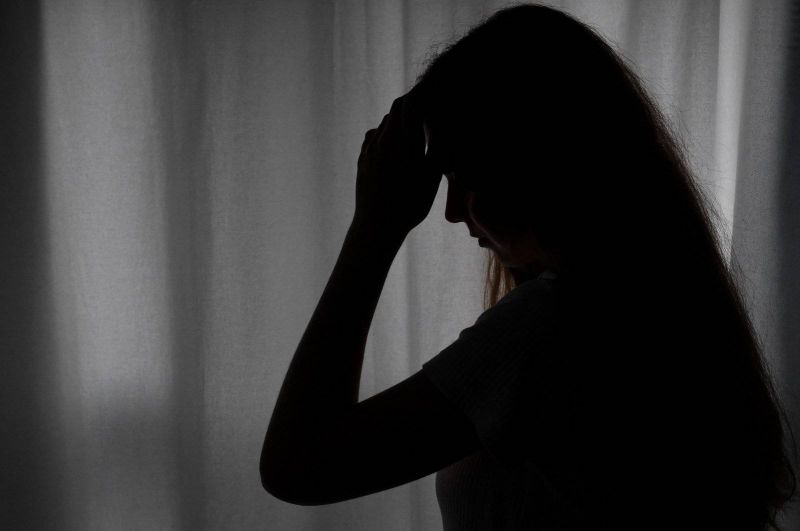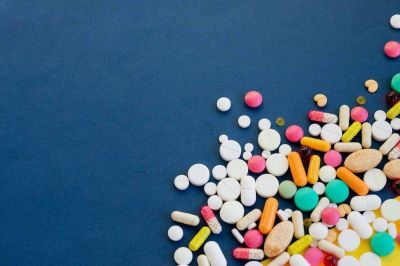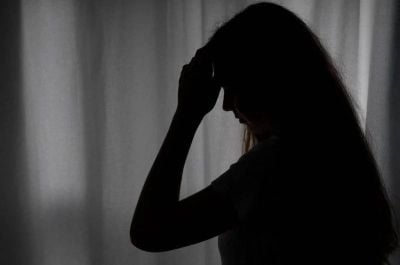
Illustrative photo, via AFP archive.
BEIRUT — “I have been struggling with depression for as long as I can remember,” says Rayane, who declined to give her real name due to the sensitivity of the subject and to protect the privacy of her family. She is a seemingly bubbly young woman whose eyes, however, betray her sadness.
“I’ve fantasized about killing myself many times over the years,” says Rayane, “but I never actually thought I would go through with it.” She has suffered from chronic depression and anxiety for years but the Beirut port blast and the effects of the country’s economic crisis have exacerbated them. She is particularly affected, she says, by her family losing their hard-earned savings and the profound sadness she has witnessed in her surroundings — on top of the overwhelming hopelessness that comes with “being stuck.”
One fateful night early this year, when Rayane became convinced she’d never find happiness or peace of mind “while roaming this earth,” she attempted suicide by overdosing on several substances.
She shudders at the memory, saying it still seems like a nightmare rather than something that actually happened to her.
“It was a wake-up call. For me and the people around me.” She’d had little luck over the years with traditional mental health treatments, including antidepressants and talk therapy, but was preparing to give therapy another try when a friend of a friend told her about a new treatment she’d read about: ketamine injections.
While ketamine was previously mostly known for its usage as an anesthetic on battlefields and in operating rooms and, among party-goers, its mind-altering psychedelic effects, the medication is making waves as a promising treatment for some cases of major depression and other mental health issues. A recent study published in the Journal of Clinical Psychiatry found that “ketamine was effective at reducing symptoms of [suicidal ideation], depression, and anxiety.”
Currently, only a handful of providers, including the American University of Beirut Medical Center and St. George Hospital offer the treatment in Lebanon.
Despite its reputation as a party drug, “ketamine is not an illegal substance. It is a medication that has been available in Lebanon for many years and is a commonly used drug in anesthesia for simple or short surgeries,” said Farid Talih, Associate Professor of Psychiatry at the American University of Beirut, who offers the treatment. “It was discovered a few years ago that it helps in depression and psychiatrists started using it. Ketamine is FDA approved in the USA and in Europe for treatment of depression and suicidal thoughts for around two years now.”
The rise of ketamine treatment comes at a time when suicide rates in Lebanon also appear to be rising. A recent report by Beirut-based research center Information International showed that suicide cases were up by 7.8 percent in the first seven months of 2022, compared with the same period last year. Meanwhile, that rate increased by at least 42 percent in July 2022, compared to July 2021.
In the 2021 study “Mental health in Lebanon: Tomorrow's silent epidemic,” published in Mental Health & Prevention, neuropsychologist Natali Farran writes that a nationally representative sample of Lebanese young persons showed that 11.5 percent suffered from suicidal ideation. According to another 2021 study by the Arab Reform Initiative, even before the spiraling compounded crises plaguing the country, around a quarter of adults in Lebanon suffered from at least one psychiatric disorder.
How does ketamine work?
Because of its rapid effects, mental health professionals say that ketamine could have a role to play in helping prevent suicide.
Ketamine functions differently from traditional antidepressants. More traditional antidepressants help balance the levels of neurotransmitters, which are responsible for communications between neurons in the brain — lower levels of these chemicals such as serotonin and dopamine tend to correspond with higher levels of depression. However, ketamine affects the glutamate system, which is used in the brain for neurons to communicate. When administered at high doses, ketamine seems to block glutamate, making it an effective anesthetic, while at low doses, glutamate production is enhanced, which may help build new connections between neurons.
When people are stressed or depressed for a long time, they can start to lose the connections, whereas ketamine seems to reverse this process by regenerating them.
When told about the treatment, at first Rayane was skeptical, as she only knew about ketamine in the context of parties, as a recreational drug.
This is a common misconception that tends to scare off patients who might greatly benefit from the treatment, Talih said.
While it’s true that ketamine is used in the powder form as a recreational or party drug, predominantly among young adults, Talih compares it to, “for example, morphine, Valium, Tramadol or Xanax being abused for non-medical recreational reasons.”
After Rayane did some online research and spoke to a psychiatrist, she grew more convinced the drug could help her. “Also, I had nothing to lose. I was living like a zombie. Neither dead nor alive. So I was desperate to try anything just to feel slightly better. Even if it would just get me out of bed.”
Lessened symptoms
The procedure is simple. After an intake appointment with a psychiatrist to ensure the patient is not in an at-risk group, such as suffering from substance abuse, the patient can schedule an appointment to receive the ketamine infusion.
A specifically calculated amount of ketamine based on the patient’s body weight is administered intravenously over a 40-minute session. The desired effect is a notable mood lift while still awake and alert. “The mood elevation is notable and may last up to several weeks after even just one administration,” according to a 2021 psychiatric study, medical website Medscape reported Wednesday.
Many patients will require a subsequent ketamine infusion with so-called “booster” infusions, depending on the specific symptoms and physiology. Most ketamine patients with depression maintain a very strong clinical response over time, with 75 percent seeing lessening depressive symptoms, according to the Medscape article.
In comparison, the study shows, the success rate for repetitive transcranial magnetic stimulation, another treatment, is 40-60 percent “depending on the modality.” For certain serotonin reuptake inhibitors, which are a type of antidepressant, the success rate “is somewhere between the mid-20s and low-30s percent range.”
Some already benefit from two sessions, though others may need up to eight to see a significant improvement, several studies show. However, in the case of patients with suicidal tendencies, even just one treatment could significantly reduce symptoms.
Up to 90 percent of ketamine therapy patients have seen lessened suicidal ideation, says George Karam, chairman of psychiatry and clinical psychology at St. George Hospital, which offers the treatment. “So even if the depression is longer-lasting, at least they're not suicidal anymore.”
Patients ‘should be informed about this option’
Why is a potentially life-saving treatment not more widely known among those with mental health issues, let alone the general population?
Karam, who says that his department at St. George Hospital has been offering ketamine infusions since 2017, believes that this is partly due to a lack of referrals from other psychiatrists.
“It shouldn’t be up to the patient to discover the existence of this treatment. They should be informed about this option.”
Rayane says that she’s far from the only one in her direct social circles who has had to research and seek out alternative treatments by herself or through friends. “It’s actually crazy how we get more information about mental health issues and possible coping mechanisms through Instagram accounts and other social media than through school or doctors,” she says.
“Not to mention the fact that, even though our generation has learned to talk about it more, there’s still a massive taboo in society when it comes to mental health problems. No one wants others to think that they’re crazy, or, even worse, weak.”
Although some psychiatrists and other mental health professionals might be hesitant to prescribe ketamine treatments due to a lack of large-scale studies, available scientific data looks promising. These positive results are concurrent with what Karam and Talih have encountered in their practice.
“Roughly speaking, I would say in the last five years, we treated a little over 100 patients,” Karam says. “And while the literature tells you that around 50 percent of people who do ketamine infusions will get better, our data is a bit better than 50 percent” due to him and his colleagues choosing which patients will receive the treatment based on an assessment of who might benefit the most. That selection process “leads to a 70 percent improvement of patients who are treatment-resistant.”
Additionally, Karam says, with people who are suffering suicidal thoughts, the treatment can remove those tendencies within 24 hours. “And there's no other medication that can do that, except ketamine.”
In short, of the 70 percent of patients who responded to ketamine treatments, 50 percent feel the effects within the first two sessions — that is, within the first week.
And even with the other 50 percent who need to wait another week to feel the effects, those effects arrive twice as fast as more common medications such as antidepressants.
However, there are also downsides to the treatment.
“The problem with ketamine is that it's not long-lasting, so if you administer the ketamine without the patient being on an antidepressant, they might relapse within two weeks to a month,” Karam says. “Alternatively, patients would need maintenance therapy, which means they’d have to get infusions every few months, which isn’t ideal as we are worried about long-term use. For instance, while the risk of addiction is low, it’s still present.”
Talih says that, in the approximately two years they’ve been administering ketamine infusions at AUB, only around 10 percent of patients did not respond to the treatment at all. “The rest have a variable response which can range from 30 percent to almost 90 percent reduction in depression.”
Additionally, Talih says, in the case of acute suicidal thoughts, “the reduction is around 90 percent.”
However, the cost of each infusion varies between $170 and $270, which exceeds the monthly income of many workers in Lebanon, making it a virtually inaccessible treatment to most. Some patients might end up needing up to eight sessions, Karam says. By comparison, one session sets you back $495 on average in the US, where it’s also not covered by insurance.
“While it seems very expensive, we compare it to the cost of hospitalization and treatment for people with suicidal ideation or after a suicide attempt, which will set you back thousands of dollars,” Karam says.
More patients seeking treatment
Despite the high cost, Talih has noticed a clear increase of both referrals and patients seeking out the treatment on their own.
“The number is definitely increasing. I used to have maybe one or two patients, every week or two. This week alone I had at least five patients,” Talih says. One reason for this, he says, is that there’s more awareness about the treatment. “And on the other hand, as we’ve seen an increase not only in patients suffering from depression but the depression getting worse, as traditional medication is not sufficient enough to treat it.”
Prior to the country’s compounded crises, Talih had been in talks with a pharmaceutical company to introduce the FDA-approved esketamine nasal spray to the Lebanese market. The ketamine-derived spray, under the name Spravato and approved for US use in 2019, is meant for “treatment-resistant depression in adults and depressive symptoms in adults with major depressive disorder with acute suicidal ideation or behavior, in conjunction with an oral antidepressant.”
While this development is on hold for now, it’s good to have another option to look forward to, says Karam. He adds that the manufacturers of the spray had approached him to give trainings on prescribing and administering the medication.
Both psychiatrists say they’ve noticed a strong increase in patients with suicidal tendencies since the start of the crisis. “It’s hard not to be unhappy in Lebanon at the moment,” Talih says. “I’d say anyone who isn’t unhappy in this country is likely detached from reality. Unless you’re a psychopath.”
And while ketamine infusions might not solve the underlying causes that lead increasingly more people to consider and even try ending their lives, it has proven to be an effective and quick treatment to at least temporarily prevent them from actually doing so.
“I’m still depressed,” Rayane says with a wry smile, “but at least I’m not dead.”
Lebanon's National Emotional Support and Suicide Prevention Helpline, The Lifeline, can be reached at 1564.
Correction: This article has been updated to reflect the fact that ketamine treatments currently available in Lebanon range from $170 and $270. A previous version stated that the average cost was $270.



